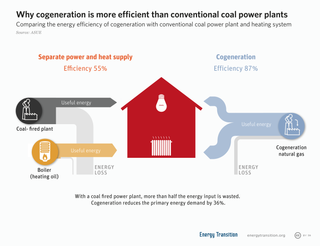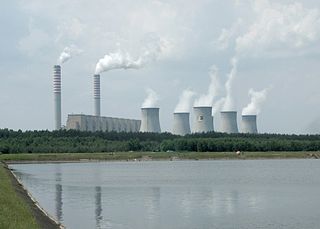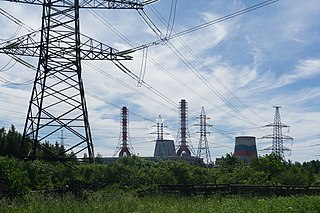
A fuel cell is an electrochemical cell that converts the chemical energy of a fuel and an oxidizing agent into electricity through a pair of redox reactions. Fuel cells are different from most batteries in requiring a continuous source of fuel and oxygen to sustain the chemical reaction, whereas in a battery the chemical energy usually comes from substances that are already present in the battery. Fuel cells can produce electricity continuously for as long as fuel and oxygen are supplied.

A combined cycle power plant is an assembly of heat engines that work in tandem from the same source of heat, converting it into mechanical energy. On land, when used to make electricity the most common type is called a combined cycle gas turbine (CCGT) plant, which is a kind of gas-fired power plant. The same principle is also used for marine propulsion, where it is called a combined gas and steam (COGAS) plant. Combining two or more thermodynamic cycles improves overall efficiency, which reduces fuel costs.

Cogeneration or combined heat and power (CHP) is the use of a heat engine or power station to generate electricity and useful heat at the same time.

A fossil fuel power station is a thermal power station which burns a fossil fuel, such as coal, oil, or natural gas, to produce electricity. Fossil fuel power stations have machinery to convert the heat energy of combustion into mechanical energy, which then operates an electrical generator. The prime mover may be a steam turbine, a gas turbine or, in small plants, a reciprocating gas engine. All plants use the energy extracted from the expansion of a hot gas, either steam or combustion gases. Although different energy conversion methods exist, all thermal power station conversion methods have their efficiency limited by the Carnot efficiency and therefore produce waste heat.

The Prairie Island Nuclear Generating Plant is an electricity-generating facility located in Red Wing, Minnesota, along the Mississippi River, and adjacent to the Prairie Island Indian Community reservation.

The Public Power Corporation S.A. is the largest electric power company in Greece. PPC acquired Enel Romania from the Italian Enel group for €1.24 billion on October 25, 2023.

The Nuclear Power Plant in Cernavodă is the only nuclear power plant in Romania. It produces around 20% of the country's electricity. It uses CANDU reactor technology from AECL, using heavy water produced at Drobeta-Turnu Severin as its neutron moderator and as its coolant agent. The Danube water is not used for cooling of the active zone.

Enel S.p.A. is an Italian multinational manufacturer and distributor of electricity and gas. Enel was first established as a public body at the end of 1962, and then transformed into a limited company in 1992. In 1999, following the liberalisation of the electricity market in Italy, Enel was privatised. The Italian state, through the Ministry of Economy and Finance, is the main shareholder, with 23.6% of the share capital as of 1 April 2016.

Iceland is a world leader in renewable energy. 100% of the electricity in Iceland's electricity grid is produced from renewable resources. In terms of total energy supply, 85% of the total primary energy supply in Iceland is derived from domestically produced renewable energy sources. Geothermal energy provided about 65% of primary energy in 2016, the share of hydropower was 20%, and the share of fossil fuels was 15%.

North-West Thermal Power Plant is a cogeneration power station (TETs) in Saint-Petersburg, owned by Inter RAO UES. This is a first power station in Russia to use combined cycle.
Edwardsport Power Station is a 618 MW Integrated gasification combined cycle (IGCC) coal based power plant in Vigo Township, Knox County, near the town of Edwardsport, Indiana. The integrated gasification combined cycle power plant construction started in June 2008 by Duke Energy near the site of an older 160 MW coal-fired electrical power plant, which was decommissioned in 2010.

Archimede combined cycle power plant is an integrated solar combined cycle (ISCC) power generation plant at Priolo Gargallo near Syracuse in Sicily, Italy. The combine cycle section was inaugurated in 2003, and the solar field on 14 July 2010. The solar field is the first to use molten salt for heat transfer and storage which is integrated with the combined-cycle gas facility. It uses technology developed by ENEA and Archimede Solar Energy, a joint venture between Angelantoni Industrie and Siemens Energy. Archimede is owned and operated by Enel.

Enel Russia is a Russian power generation company created by the reorganization of RAO UES, a former united power company of Russia. The company is registered in Yekaterinburg and its headquarters are in Moscow. The Italian Enel Group owns a majority stake of the company (56%).

Hi-Gen Power was a London-based developer of projects combining underground coal gasification with carbon capture and storage and alkaline fuel cells. It was established in 2009 to commercialize alkaline fuel cells developed by the fuel cell manufacturer AFC Energy. It is affiliated with B9 Gas.

Enel Green Power S.p.A. is an Italian multinational renewable energy corporation, headquartered in Rome. The company was formed as a subsidiary of the power generation firm Enel in December 2008. It has operations in five continents generating energy from solar, geothermal, wind and hydropower sources. As of 2024, it manages a capacity of 63,6 GW and has over 1300 plants worldwide.
Italy's total electricity consumption was 302.75 terawatt-hour (TWh) in 2020, of which 270.55 TWh (89.3%) was produced domestically and the remaining 10.7% was imported.

Geothermal power accounts for about 1.6-1.8% of the total electric energy production in Italy and is about 7% of the total renewable energy produced in 2010. The total energy from Geothermal was 5,660 GWh in 2015. Italy is the seventh country by geothermal installed capacity.

The Alessandro Volta Power Plant was a 3600 MW polycombustible thermal power plant located in the municipality of Montalto di Castro and owned by Enel.















